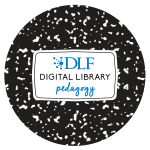 This update comes to us from Elizabeth Joan Kelly, Digital Initiatives Librarian at Loyola University New Orleans, and Jessica Otis, Digital Humanities Specialist at Carnegie Mellon University Library, both from the DLF Digital Library Pedagogy Group.
This update comes to us from Elizabeth Joan Kelly, Digital Initiatives Librarian at Loyola University New Orleans, and Jessica Otis, Digital Humanities Specialist at Carnegie Mellon University Library, both from the DLF Digital Library Pedagogy Group.
The DLF Digital Library Pedagogy group formed as an outgrowth of conversations at DLF 2015 in Vancouver around the teaching of digital skills in a library context. It has a dedicated Google group that is open for anyone interested digital library pedagogy and holds regular Twitter chats using the hashtag #DLFteach. In 2016, several working subgroups formed to explore topics of mutual interest in more depth, including a group that focused on creating an environmental scan of existing resources, broadly defined, that might be useful for our membership.
Digital library pedagogy is a relatively niche field combining digital scholarship, digital humanities, pedagogy and instructional best practices, and digitized/born-digital collections. There is little scholarship and few dedicated resources specific to digital library pedagogy, so our hope is that bringing currently available scholarship and resources together into a single location will begin to fill this need. Already our environmental scan has been useful in conceptualizing several different categories of digital library pedagogy resources. We divided our resources into collections of assignments and lesson plans, such as Project Cora and the HASTAC Pedagogy Project; tutorials and how-to’s ranging from Miriam Posner’s How Did They Make That series to Code Academy; data sources from a wide variety of academic, government, and independent online sources; listservs such as Humanist and ILI-I; and affinity groups such as dh+lib. Using these resources, digital library practitioners can develop technical skills, utilize lesson plans developed by others, choose data sets to teach with, and find similar communities of practice.
To date, the scan includes ~70 resources, and we know that it isn’t complete. This is still a living document and we welcome further contributions. To add to the environmental scan, simply list the resource name, its URL, select its resource type from the dropdown list, and add any additional notes to the “Add new resources here!” tab on the spreadsheet.
The Digital Library Pedagogy group is also soliciting input on how we should make this resource more widely available. Some possible options include the DLF wiki, the DLF website, as a standalone static site, or for the environmental scan to remain a Google sheet with suggesting capabilities. What do you think? Fill out the following 1 question poll by 28 April to let us know how this resource could be most usable to you.
